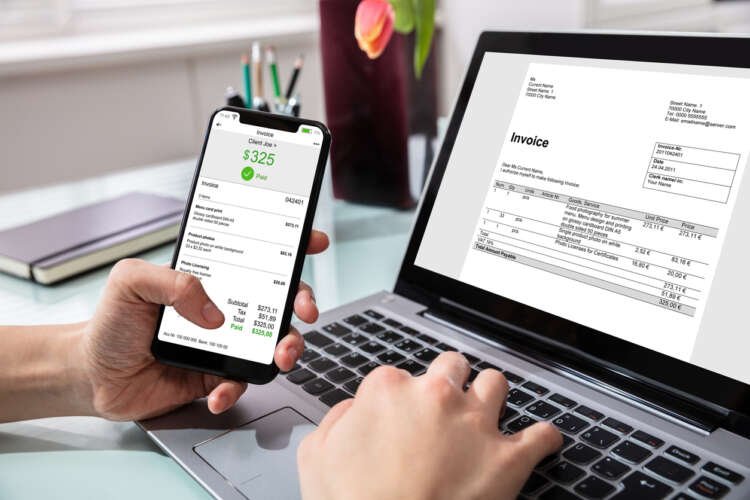Leveraging digital invoicing to maintain cash flow during an economic crisis
Published by Jessica Weisman-Pitts
Posted on December 2, 2022
5 min readLast updated: February 3, 2026

Published by Jessica Weisman-Pitts
Posted on December 2, 2022
5 min readLast updated: February 3, 2026

By Antony Paul,Global Product Head, Quadient
The current economic uncertainty has organisations, both large and small, keeping a much closer eye on their cash flow. At a time when every penny matters, this means that businesses must have an accurate view of their finances at all times. Particularly for SMBs, this can mean the difference between success and failure.
While something that all back office and finance teams will have to deal with on a daily basis, invoices can have a monumental impact on your bank balance. B2B companies like wholesalers and manufacturers, for example, can have a huge number of recurrent invoices. If tracked incorrectly, unpaid invoices can give business owners a false sense of security. But when properly automated, digital invoicing tools can help SMBs to recession-proof their business.
An antiquated view of invoicing
Invoicing may not be the most exciting part of a finance role, but it is one of the most important. It is essential to ensure that invoices are paid on time and correctly in order to maintain cash flow. This is even more important as SMBs start to feel the pinch.
It’s mission-critical, but invoicing is often approached in an outdated and cumbersome manner. As a traditionally very manual task, inputting invoicing data and tracking payments is hugely time-consuming for already stretched finance teams.
On top of this, manual invoicing is prone to human error. It’s easy for a zero to be accidentally missed off an invoice, or for a payment request to be forgotten. Paper invoices can also get lost and so copy invoice requests can cause delays and inefficiencies. This can be disastrous for SMBs who can’t afford to pay an invoice twice or damage relationships with suppliers. Even more worrying is if this human error impacts money coming in, companies need to diligently stay on top of invoices otherwise they risk impacting their bottom line, losing trust, and potentially falling behind competition. In fact, half of all payments made to small businesses are paid late, costing small businesses £684 million per year. SMBs simply can’t afford to not properly track and manage their invoices.
The move to hybrid working over the past few years has also shone a light on how invoicing has not kept up with modern ways of working. Many manual invoicing tasks can still only be completed in the office because there aren’t the tools available to support remote working. Not only does this reduce the productivity of teams, as invoices can now only be paid on the few days that the relevant individuals come into the office, but it can also contribute to employee resignation and lower engagement as staff become frustrated with outdated processes.
So how can SMBs bring invoicing into the 21st century?
A modern approach to invoicing
Digital invoicing solutions offer SMBs an easy and automated way to manage and track their finances in one single platform. It removes the headache of monitoring payments across multiple accounts and customers, so that businesses can focus their attention on more pressing issues.
The time spent on invoicing-related tasks can be reduced when businesses adopt digital platforms. Data can be automatically extracted, so that finance teams can focus on more complex and valuable tasks. This also reduces the likelihood of human error so that finance directors can be confident in the knowledge that invoices will be paid on time and correctly. This has a monetary value too as there is less chance of needing to reprint invoices and statements because the originals have been lost or are incorrect.
Digital invoices also help organisations with compliance and security. For example, the use of a digital platform enables SMBs to archive invoices to prove compliance. Many government agencies also now require e-invoices to ensure security and accuracy. The UK is behind the curve in mandating this, but for many companies B2B and business-to-government invoices have to be digital. If SMBs are to truly future-proof themselves, then preparing for this likely change in the UK is necessary, otherwise they may risk not being able to do business with those who require digital invoices.
However, the most valuable benefit of digital invoicing tools is that they give finance and business leaders an accurate view of how the company is doing at all times. In order for business leaders to understand their financial state of affairs, an important starting point is knowing the status of all their invoices and ensuring that this is correct. Digital invoicing automates this function so that leaders have the relevant and up-to-date information to hand whenever they need it.
Future-proofing your business
Planning and preparing for hardship is critical if SMBs are to survive, so having an accurate view over finances is essential. This will arm business and finance leaders with the tools they need to make any necessary changes to future plans. But this will also give all members of the team an opportunity to reduce time spent on manual and mundane tasks. With ‘recession’ the word on everyone’s lips, businesses will be looking to do more with less. Having an automated and digital invoicing platform is vital for SMBs to ensure that they have great visibility over their finances as the storm clouds gather overhead.
Digital invoicing is the process of sending and receiving invoices electronically, allowing for faster payment processing and improved tracking of financial transactions.
Compliance in finance refers to the adherence to laws, regulations, and guidelines that govern financial practices and transactions.
SMBs, or small and medium-sized businesses, are companies whose personnel numbers fall below certain limits, often characterized by limited resources and revenue.
Automation in invoicing involves using technology to streamline the invoicing process, reducing manual tasks and minimizing errors.
Explore more articles in the Business category











